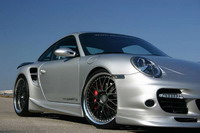EU court opens road for Porsche takeover
Porsche deliberately failed the last time it made a takeover for Volkswagen. That is unlikely to repeat.

The sports car company has an open road for another attempt, after the European Union's highest court struck down the nearly 50-year old "VW law" enacted to protect Europe's largest automaker from a hostile takeover.
Tuesday's ruling will reverberate across Europe, where many governments have attempted to protect companies they see as vital to their economies from being bought, particularly by foreign investors.
German politicians and labor unions had argued that the 47-year-old measure was needed to protect local jobs.
The EU Court of Justice, however, said the law - which capped a shareholder's voting rights at 20 percent, whatever the size of its holding - limited "the free movement of capital" that is a tenet of the European Union.
It also said the measure discouraged foreign investors from taking a stake in Volkswagen, because the German government - the state of Lower Saxony, VW's second-biggest shareholder - was able "to exercise considerable influence" over the company.
The ruling is a triumph for the European Commission, which has fought several battles against European governments and their "golden shares" in critical companies.
"Special rights have become an ever-more-endangered species on their way to extinction," EU spokesman Oliver Drewes said. "They dissuade investment in the company in their full potential."
"We had a number of court cases over the last few months and years and you see that ... golden shares are really on the way out and jurisprudence is quite clear on these matters," he said.
The EU is also looking at other companies, and countries, including Germany's E.On-Ruhrgas, Telecom Italia and Portuguese stakes in Portugal Telecom, Energias de Portugal and GALP Energia. It has warned both Hungary and Poland over laws that give the government rights in several companies.
Last year, it won court backing to rule illegal the Dutch government's controlling minority stake in telecom company Royal KPN NV and the Dutch Post Office TNT Postgroep NV.
As the EU basked in its triumph over the "VW law," Porsche got a green light to take a bigger stake in VW.
The Stuttgart-based maker of high-end sports cars has spent 5 billion EUR(US$7.13 billion) to buy 31 percent of Volkswagen AG since 2005, with what analysts say is a view toward eventually acquiring it outright.
Porsche was forced by German law to file a formal offer in April after its holding in Volkswagen surpassed 29.9 percent, but the bid price was intentionally low, and the offer failed.
Since then Porsche CEO Wendelin Wiedeking has done little to dampen speculation about a takeover, saying last month that the company was mullinga larger stake.
Wiedeking was guarded Tuesday, saying only that "we obviously have a high interest in exercising our voting rights in full." But he has also said that owning a majority stake in VW would help Porsche's efforts to work with Europe's biggest carmaker in developing new models, engines and other components.
The company likely could buy more shares, having reportedly lined up a 10 billion EUR(US$14.25 billion) line of credit to do so. But a decision can come only from its supervisory board, which meets Nov. 12.
Investors seemed to bank on it, pushing Porsche shares up 4.1 percent to 1,708.41 EUR(US$2,436.24) while Volkswagen shares fell 5.9 percent to 169.73 EUR(US$242.04).
Analysts say a dominant and controlling stake in the Wolfsburg-based automaker could help improve VW's weak showing in the United States - a key market for Porsche.
"Porsche are some of the most skilled capitalists in the global auto sector, with an obsession for efficiency, product quality and brand management - all skills which can help VW greatly," said Adam Jonas, who follows the European auto industry for Morgan Stanley in London.
The 20.36 percent of Volkswagen held by Lower Saxony gives the German state and Porsche more than 50 percent - meaning the door already is closed for any would-be foreign suitors.
Volkswagen said in a statement it would examine the ruling and its "potential consequences." Germany's federal Justice Ministry said it would move immediately to comply with the ruling.
Lower Saxony's governor, Christian Wulff, said the state accepted the decision. He said it would stand by its stake in Volkswagen and that its aim was "for VW to be a successful company with high sales and satisfied employees with secure jobs, particularly at sites in Lower Saxony."
Industrial union IG Metall, criticized the ruling. Union leader Juergen Peters said it was a sign of European institutions' distance from ordinary people if "free movement of capital and thus the interests of investors are given a higher value than the interests of employees."
Were Porsche to acquire Volkswagen, it would be a case of a smaller company gobbling up its larger partner.
Porsche sold 97,515 cars in the year ended July 31, with sales of 7.4 billion EUR(US$10.48 billion). Volkswagen - whose brands include Seat, Skoda, Audi and Lamborghini - sold 3.1 million cars in the first six months of 2007 and expects its sales for this year to top the 104.9 billion EUR it reported in 2006.
Also, Volkswagen's board chairman and former CEO, Ferdinand Piech, is a member of the family that controls Porsche - keeping it a family affair. The court ruling reaffirmed that, Jonas said, as "VW moves from the status of a state-controlled company to that of a family run company."
Subscribe to Pravda.Ru Telegram channel, Facebook, RSS!


